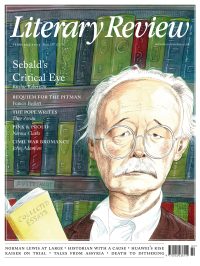Sam Reynolds
Living History
We Do Not Part
By Han Kang (Translated from Korean by E Yaewon & Paige Aniyah Morris)
Hamish Hamilton 384pp £18.99
Martial law has been declared seventeen times in South Korea. The most recent instance, in December, was short-lived – it lasted barely one night – but it stands as a sharp reminder of the political violence on which the country was built. In November 1948, three months after the republic had been established, a state of emergency was declared to suppress a communist-led insurrection on the southern island of Jeju. The uprising precipitated the beginning of the Korean War, during the first months of which an estimated 200,000 civilians were massacred and buried in secret. In May 1980, the last time before 2024 that a state of emergency was imposed, hundreds of people, many of them students, were murdered by the military during demonstrations in Gwangju.
Han Kang, the winner of the 2024 Nobel Prize in Literature, makes just one allusion to this history in her best-known novel, The Vegetarian (published in Korean in 2007), in a passage ostensibly more concerned with art than with politics. The story centres on Yeong-hye, a young housewife in present-day Seoul, who suddenly resolves to stop eating meat. Yeong-hye’s brother-in-law, we’re told, is nicknamed ‘the May priest’ – a reference to the Gwangju killings – due to the style of the short films he makes. At the time The Vegetarian was published, there was little to suggest that Han would devote a whole novel to the May uprising. But in Human Acts (published in Korean in 2014) she did just that. If The Vegetarian is concerned with history as something that continues to affect the novel’s characters in the 21st century, Human Acts, which opens with a boy from Gwangju tending to rotting corpses, engages with the historical events themselves. Han has recognised that Human Acts represents a turning point in her work, away from novels of ‘light and warmth’ and towards explorations of historical slaughter and grief.
We Do Not Part develops this trend. The narrator, Kyungha, is a middle-aged writer living in contemporary Seoul. One day, out of the blue, her friend Inseon asks her to travel to her home on Jeju. Inseon, a documentary filmmaker, has cut off two of her fingers in a woodwork

Sign Up to our newsletter
Receive free articles, highlights from the archive, news, details of prizes, and much more.@Lit_Review
Follow Literary Review on Twitter
Twitter Feed
Under its longest-serving editor, Graydon Carter, Vanity Fair was that rare thing – a New York society magazine that published serious journalism.
@PeterPeteryork looks at what Carter got right.
Peter York - Deluxe Editions
Peter York: Deluxe Editions - When the Going Was Good: An Editor’s Adventures During the Last Golden Age of Magazines by Graydon Carter
literaryreview.co.uk
Henry James returned to America in 1904 with three objectives: to see his brother William, to deliver a series of lectures on Balzac, and to gather material for a pair of books about modern America.
Peter Rose follows James out west.
Peter Rose - The Restless Analyst
Peter Rose: The Restless Analyst - Henry James Comes Home: Rediscovering America in the Gilded Age by Peter Brooks...
literaryreview.co.uk
Vladimir Putin served his apprenticeship in the KGB toward the end of the Cold War, a period during which Western societies were infiltrated by so-called 'illegals'.
Piers Brendon examines how the culture of Soviet spycraft shaped his thinking.
Piers Brendon - Tinker, Tailor, Sleeper, Troll
Piers Brendon: Tinker, Tailor, Sleeper, Troll - The Illegals: Russia’s Most Audacious Spies and the Plot to Infiltrate the West by Shaun Walker
literaryreview.co.uk